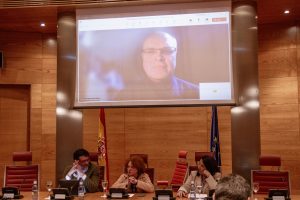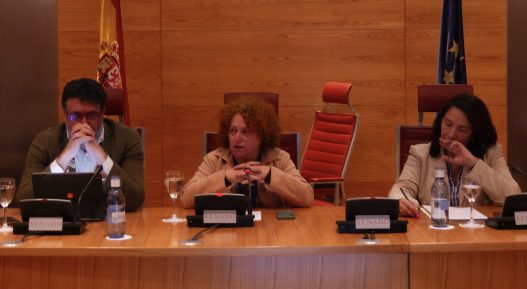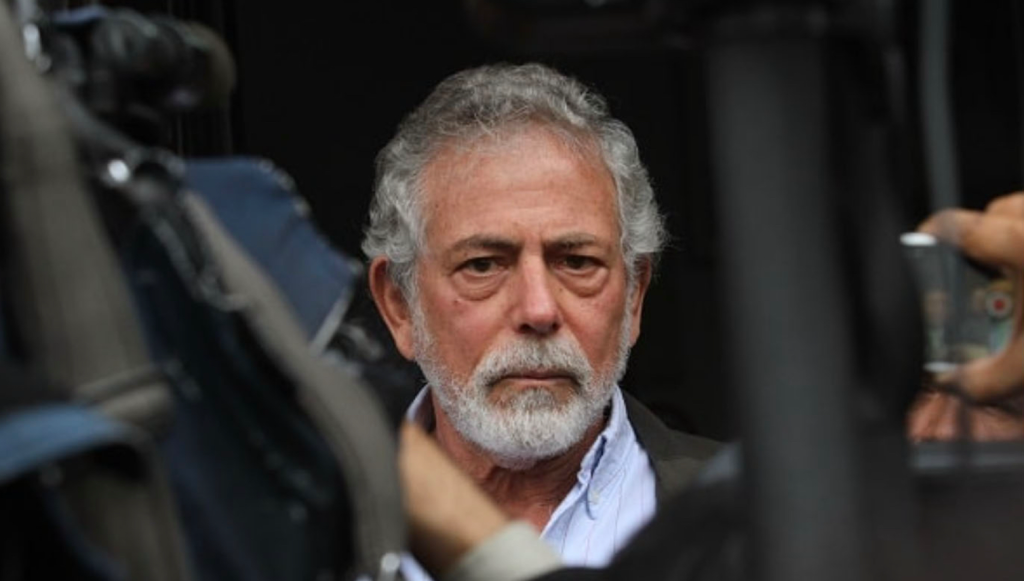
DISINFORMATION IS ALSO A WEAPON
Is there a way for a country to surrender in a conflict without using more soldiers against it? Well, apparently, yes. Computers, telephones and communication networks are required to put into action the key “weapon” of the times: disinformation.
This serious aspect was addressed during the panel entitled ‘Geostrategy. Disinformation and fake news in contemporary wars’. It took place at the VII Congress of Media Editors of the European Union, Latin America and the Caribbean, held on March 18-21, 2024 in Madrid and Brussels.
The panel in which the three experts participated took place on March 19, in the facilities of the Spanish Senate. In this video you can see a summary of the activities of that day.
The panel included Asela Pintado, executive director of the European Observatory for the Analysis and Prevention of Disinformation; Rafael Rubio, professor of Constitutional Law at the Complutense University of Madrid, and Giedrius Sakalauskas, director of the Civic Resilience Center / Res Publica.
The forum was moderated by Rita Fatiguso, journalist in charge of international affairs for the Italian newspaper IlSole 24Ore.
FAKE NEWS AND GEOSTRATEGY
Asela Pintado presented the international panorama in which the “fake news” phenomenon is developing. We have a USA whose world dominance is being disputed, with a European Union that had been displaced in the international concert, with Russia and China wanting to occupy those spaces.
“This war will be won by whoever has the best technology,” said Pintado. Because, in his opinion, “the manipulation generated and disseminated by technological means creates fear among the population and this can make people, societies surrender, without the need for soldiers”.
It is, moreover, a hyperconnected world, with technologies that make it possible to segment audiences to the maximum, personalize messages and disseminate them quickly and massively.
“In this area, technology is complicating rather than helping us,” said Pintado, because this framework makes it difficult to prove both the origin and the consequences of the dissemination of false information.
Thus, the task of the media “is titanic”, he said, because it is very complex in this environment to know what is or is not true.
Despite this difficulty, he considered it necessary to continue promoting the tasks of “fact checking” in the media, of mechanisms for verifying information to avoid falling into deception and manipulation and to stem the tide of disinformation. To this end, he also considered it important to reinforce the training of journalists and society as a whole.
THE LAWS
Can laws cope with ‘fake news’ and the not-so-innocent effects they have?
Laws are already beginning to be issued. Europe is being a pioneer in this respect, since it has enacted community regulations that, among other things, require technological platforms -through which true or false messages are massively disseminated- to take actions to curb disinformation.
For Rafael Rubio, care must be taken so that the fight against disinformation does not affect freedom of expression.
“We run the risk of overreacting,” Rubio warned. He explained that people began thinking that technology was going to save democracy, that it would help to cover empty spaces of participation. But, then it entered a valley and, as of 2016, there came to be an apocalyptic vision, that technology was going to cause the end of democracy.
Rubio believes it is important to analyze things carefully to find the best ways to deal with the situation.
Some of the measures contained in the approved regulations, he said, are unenforceable. Under the laws, 15 billion pieces of content have been removed from the web since October alone. Clearly, it is impossible to follow up on each case.
Rubio believes that the measures that the state should take against disinformation have to focus more on mitigating the procedures of creation and mass dissemination, especially in the presence of Artificial Intelligence, and not so much on analyzing whether or not the contents are in line with the truth, due to the impossibility of covering them all and because freedom of expression can be affected.
He also argues that there is a crucial task for the media: to recover their prestige as intermediaries of information, which they have been losing due to many factors.
Strong, credible media can be the spaces where citizens can easily find the verified and contrasted information they need to make better decisions in the current global context.
A BIT-BY-BIT STRUGGLE
Apart from what states and the media can do, there is also what society can do.
Giedrus Sakalauskas, from Lithuania, told about the experience they have had with the Civic Resilience Center / Res Publica, which he runs.
It is a web-based network of people from different professions, acting especially on Facebook (the main social network in his country), in different groups and different pages, with a secret brain center coordinating everything.
They started with 40 friends. They have grown to 4,000. Their task, basically, is to fight disinformation coming from Russia. When Russian or pro-Russian “trolls” issue manipulated or outright false information, the Res Publica “elves” write on the same network to refute anything that is not true.
Sakalauskas says they have done effective work in Lithuania combating Russian disinformation, which has tried to sow the idea that Europe is a failed project. But, he believes, you have to go beyond reacting to fake news and also tell your own stories, your own narrative of a successful Europe as, he assures us, it really is.
And he has been emphatic in pointing out that it is very important to educate young people to be more critical in the face of the enormous information load to which they are exposed. Media literacy among the population is fundamental, he said.
Sakalauskas delved into the actions and motivations of the “elves” in the webinar that EditoRed organized last February, the highlights of which can be reviewed in this link.
ABOUT THE EDITORS’ CONGRESS
The VII Congress of Media Editors of the European Union, Latin America and the Caribbean is an event organized by Grupo Prestomedia with the support of EditoRed, the European Commission and the European Parliament, Telefónica, Iberia and the Community of Madrid, as well as the collaboration of Universidad Rey Juan Carlos, Turismo de Galicia and Casa de América, and with Prensamedia as editorial partner.
This year, the general theme of the Congress was: “The quality of information and the credibility of the media, guarantees for democracy”. The meeting took place on March 18-19, 2024 in Madrid, Spain, and on March 20-21 in Brussels, Belgium.
————
This text is free to use. If you use it, please cite EditoRed.



